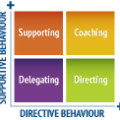 ‘What If’ Learners can make you
‘What If’ Learners can make you
or they can break you?
This is a pretty important question; one that get’s you thinking of all kinds of possibilities when you ask yourself it.
In the process of learning though, it’s a sign you could be dealing with some resistance.
This post will help you keep this learner in check and find out what they really want
You know that feeling when you’re not sure of something and afraid of the conseqences? In the course of our daily lives this ‘what if’ question can create all sorts of anxiety; ‘What if I don’t get that job?,’ ‘What if I can’t afford the new laptop?’, ‘What if I don’t get invited to that event?’
How to Spot the What Iff’er
So in our training room you have to listen out for this ‘What If’ question; it can mean one of two things.
Firstly, the What if learners might just want to apply what they are learning to other contexts, as in; ‘What if this new process you are teaching us doesn’t work for our existing clients?’
These folks are testing you out, they are already in application stage, they are thinking what can happen when they apply what they are learning with you in the real world.
 Secondly, the other ‘What if’ participant might actually be asking ‘What if’ this doesn’t work. ‘What if…my boss won’t be on board with this’, or, ‘What if it doesn’t change?’
Secondly, the other ‘What if’ participant might actually be asking ‘What if’ this doesn’t work. ‘What if…my boss won’t be on board with this’, or, ‘What if it doesn’t change?’
See if you can spot the resistance by reading the non-verbal communication which goes with that: Tone of voice, defensive posture etc.
Three ways to deal with the resistant learner
This second kind of ‘What if’ participant is really just picking a fight (metaphorically J) we have two options for dealing with them:
- Tell them to shut up (kidding, but don’t you wish you could sometimes J
- Ask them a series of follow on questions that will open them up (or, maybe even shut them up )
These follow on questions could be things like
‘How can…?’
e.g.: “How can you make this process work?’, or, ‘How can your boss be influenced to get on board?’, ‘How can the change be made easier?’
‘What could…?’
e.g.: “What could you do to influence the process, or adapt it somehow?”, or, “What could happen if you tried…A, B, C, etc”
‘What would happen if…?;
e.g. “What would happen if we adjusted the coding on the site and our existing clients could still input their orders until we get around to their sites and train them up the new process?’, or, ‘What would happen if you challenged your boss a little and presented a business case for why you think this change won’t work and offered up some alternatives?’
In each of these examples you’re given a chance to draw more out of your learner’s supposed resistance and get them thinking outside of their perceived limitations. Or at the least, not be a pushover when they get a little resistant to changing behaviours – which is what training is all about, right
How else do you question the ‘What Iff’er’?






